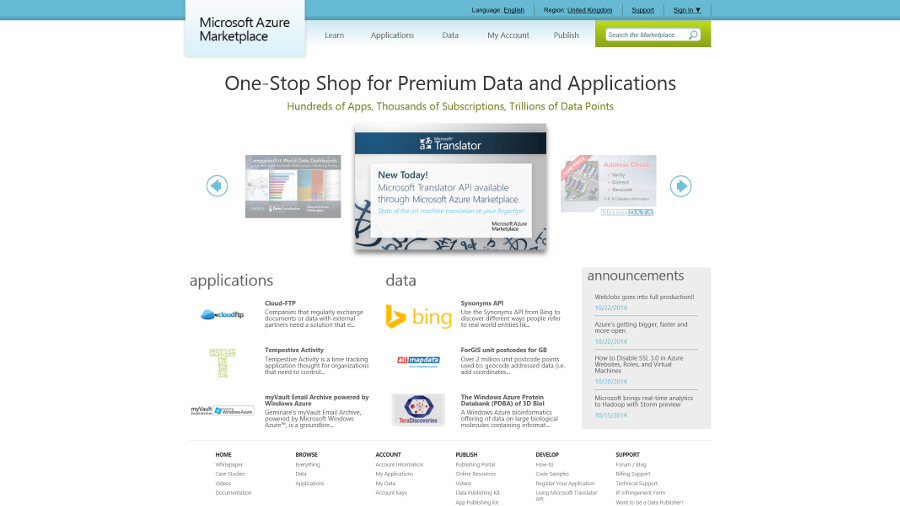A closer look at Microsoft's new Azure Marketplace
It's all about top quality enterprise apps

On top of recent announcements concerning more powerful virtual machine sizes for running more intensive workloads and hardware for running your own Azure-consistent private cloud, Microsoft has also just launched the Azure Marketplace.
The Marketplace is an app store for SaaS applications and data sets that businesses can use for BI and big data, with the usual app store features of trials and integrated billing. It boasts some bigger name apps, including Cloudera – this Hadoop-based big data platform has previously been something you would run on your own Hadoop cluster (on-premise or in the cloud). Now you can buy it as a service you can run on Azure (or on a Microsoft private cloud on-premise) without needing to set it up.
Quality apps
Picking those kind of quality enterprise tools is what the Azure Marketplace is about, Azure corporate vice president Jason Zander told TechRadar Pro – there are no automated approvals, the way Google Play and the Windows Phone Store let developers publish.
Zander notes: "We're bringing together startups and independent software developers with our Enterprise customers and we want to make sure they have an awesome experience. So we're working very closely with the first partners and we're doing a curation process – that is primarily making sure that everything that's in the marketplace has been tested and is great quality." That means there might be a small number of apps to start with "but we'll hit acceleration mode pretty quickly," he claims.
Initially, the Azure Marketplace is separate from the Azure agent, which lets you run monitoring or management tools inside your Azure virtual machines automatically, but Zander predicts that they'll come together in the future. "The agent is one of the mechanisms for how we can make it easier as you build this kind of software. We started off with some of the antivirus tools, the anti-malware components there, because we had requests, and again we are following a curated approach to make sure everything we put in is tested. I do expect as the Marketplace comes out that we'll combine it with that."
Public, private and in-between
Cloudera integrates with several Microsoft services, including Office 365's PowerBI business intelligence tools and the Azure ML machine learning service (so you could drill in to visualise your big data or use it to power a recommendation engine on your website, or to do predictive analytics).
Apps don't have to integrate with Microsoft tools and services to be on the Azure Marketplace, but Zander expects that many of them will at least work with Azure Active Directory. "The identity management components ties the whole thing together and actually makes it really super easy to use the system. Even if your cloud solution isn't running on Azure, being able to integrate with identity and work with enterprises and their identity systems is actually a very powerful way to start."
Are you a pro? Subscribe to our newsletter
Sign up to the TechRadar Pro newsletter to get all the top news, opinion, features and guidance your business needs to succeed!
Zander sees the Marketplace as a way for startups and smaller developers to reach business companies they might otherwise find it hard to market to. "We think our enterprise customers want choice, they want new innovation, they want the new technologies; but they want that delivered in a way that they can consume it and make it part of their existing systems. That's why Azure AD is an awesome thing, because it federates with your existing identity store and you can start to use it straightaway."
He continues: "We also have our hybrid story which allows me as a developer to build and deploy in the public cloud on Azure and get that integration. But I can also decide to deploy my work into private cloud as well and it's a consistent experience. Or take Cloudera as an example – you can actually do the hybrid in-between as well. I can run my service in the public cloud and I can connect it, through ExpressGate [the Azure MLPS service that lets you connect directly from your data centre without going over the internet] to a private cloud. I can use the domain servers and directory systems and everything else. So we think we've got the most flexible system for this."
Mary (Twitter, Google+, website) started her career at Future Publishing, saw the AOL meltdown first hand the first time around when she ran the AOL UK computing channel, and she's been a freelance tech writer for over a decade. She's used every version of Windows and Office released, and every smartphone too, but she's still looking for the perfect tablet. Yes, she really does have USB earrings.
